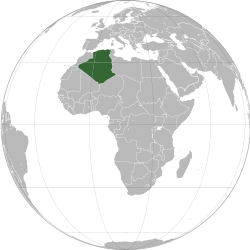Algeria: Islamists May Boycott Local Elections
By Magharebia
By Ademe Amine
After a decisive defeat in this year’s legislative elections, Islamist parties in Algeria are showing an uncharacteristic lack of enthusiasm for the November 29th local elections.
The Green Algeria Alliance, composed of the Movement for a Peaceful Society (MSP), Ennahda and al-Islah, won 48 of the 462 seats in the People’s National Assembly in the May 10th vote. The unexpected blow has dented their electoral enthusiasm.

During a press conference held in the middle of September at the headquarters of the Front for Justice and Democracy (FJD) in Algiers, the party’s president, Saad Abdallah Djaballah, who is one of the kingpins of the Islamist movement in Algeria, confirmed that his party would not participate in the elections.
The president of the New Algeria Front (FAN), Djamel Benabdeslam, has left things up in the air. On September 14th, he announced that the question of whether his party would take part in the local elections would be decided by the party’s National Council.
The current situation, he said, “is not favourable to our participation in the elections, especially under an authority in which we have no confidence”.
The Front for Change (FC) led by Abdelmadjid Menasra will boycott the November 29th poll. This decision was taken after extensive consultation of the party’s grassroots and top brass. The verdict was unequivocal: “The party is almost unanimously in favour of a boycott,” commented Idriss Rebouh, the FC’s press officer.
“These elections are being organised by the same parties that rode roughshod over the will of the people and falsified the results of the legislatives,” he said indignantly.
Meanwhile, the president of the MSP, Bouguerra Soltani, remains undecided about whether his party will participate. Having called for “the idea of communal governments to be dropped in favour of commune authorities that are elected by the people in a completely free and democratic manner”, Soltani threatened to “withdraw from the forthcoming elections if the electoral lists of the parties taking part are not approved in full”.
In the face of these withdrawals by Islamist parties, the so-called secular parties look set to win control of elected authorities. As a result, these elections will usher in sweeping changes to Algeria’s political landscape.
Having boycotted the legislative vote in May, the Rally for Culture and Democracy (RCD) has decided to run in the local elections.
Ali Laskri, the first national secretary of the Socialist Forces Front (FFS), another secular party, announced on September 8th that his party would stand in the local elections in order to continue with its campaign for “a culture of peace and peaceful dialogue”.
“We need to counter this culture of violence which people are now resorting to in order to demand their rights,” Laskri underlined.
He urged Algerians, and women in particular, to register on electoral rolls “if they want peaceful change” and if they want to “empower the real democratic alternative that is the FFS”.
The public seems divided on the issue. “This is not good news, even if it suits the other political movements in Algeria,” commented Sidali Hamid Cheurfa, a teacher of politics and international relations at the University of Algiers.
“It is essential to bring the Islamist movement into the electoral process, which is foundering,” Cheurfa added.
Ouakrif Ali, a pro-democracy campaigner, said that the Islamists were all the more worrisome because “they have at their disposal thousands of mosques where they can exploit religion in order to indoctrinate young people and peddle dreams to them.”
